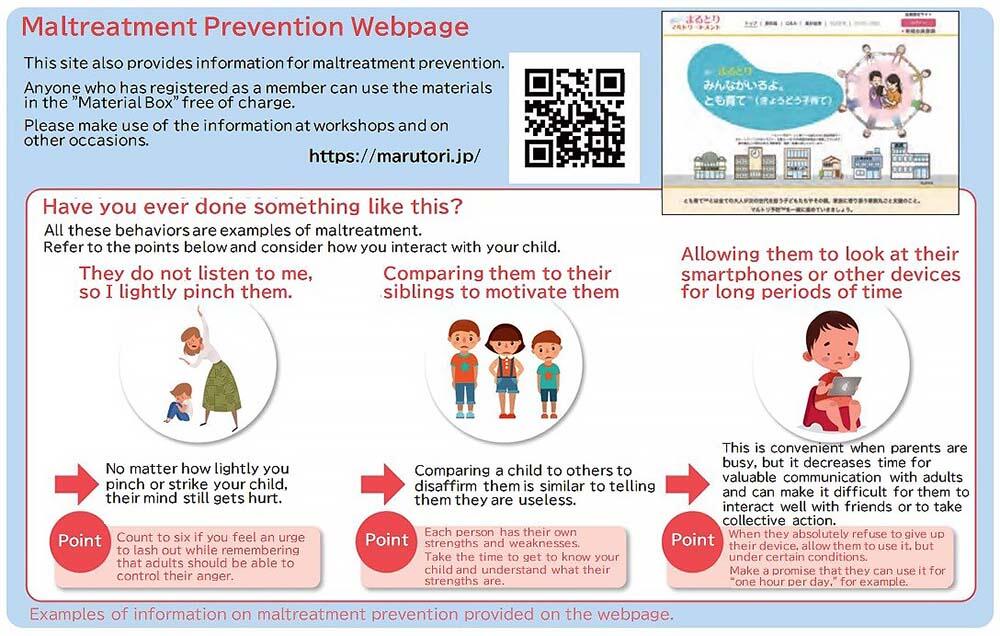Along with a declining birthrate, aging population, and the changing of the nuclear family, many families are raising their children isolated from society. Child abuse goes against social conventions and is prohibited by law, but the number of cases of abuse continues to increase. Professor Akemi Tomoda, the Head of the Center for Child Development Studies at Fukui University, is working to solve these problems based on her knowledge of neuroscience. She has clarified the effects of maltreatment, which refers to undesirable relationships between parents and children, on the development of a child's brain. She has investigated desirable ways of raising children. She endeavors to build a "community raising" society where children can be raised with peace of mind by their entire community.
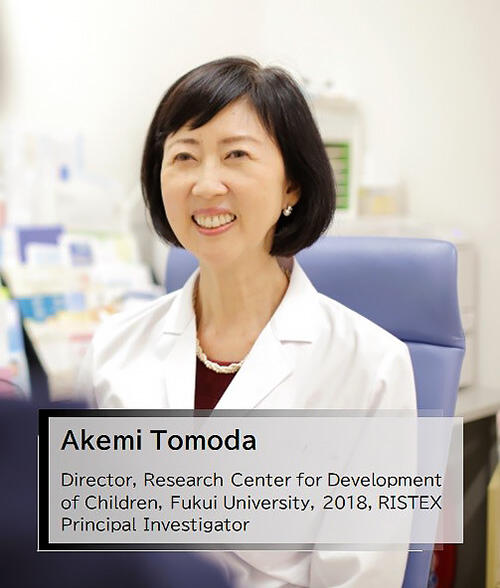
'Tough love' can damage the brain and reduce ability to control emotions
Child abuse has become a serious social issue in recent years. The number of counseling cases in the Child Guidance Center also increased, reaching about 198,000 cases in 2020. Abuse can be divided into four main categories: physical abuse, sexual abuse, neglect, and psychological abuse (Fig. 1). Abuse includes minor corporal punishment such as "hitting the hands" and "disaffirming a child by comparing them to others and/or their siblings," acts that are often confused with discipline in Japan. The World Health Organization (WHO) defines these and other undesirable relationships and parenting styles between children and their parents as "maltreatment."
Professor Akemi Tomoda, Director of the Center for Child and Mental Development at the University of Fukui, who has been working on the issue of child abuse from the perspective of both a neuroscientist and a pediatrician, points out that maltreatment is a problem that can occur in any home. "No parent sets out to abuse their child from the beginning. Comparatively minor forms of maltreatment, including physical discipline or "tough love," can gradually become increasingly severe, and can lead to horrific outcomes." In Japan, the revised Child Abuse Prevention Law came into effect in April 2020. The passage of this law, which prohibits corporal punishment from parents, represents a step forward on this front.
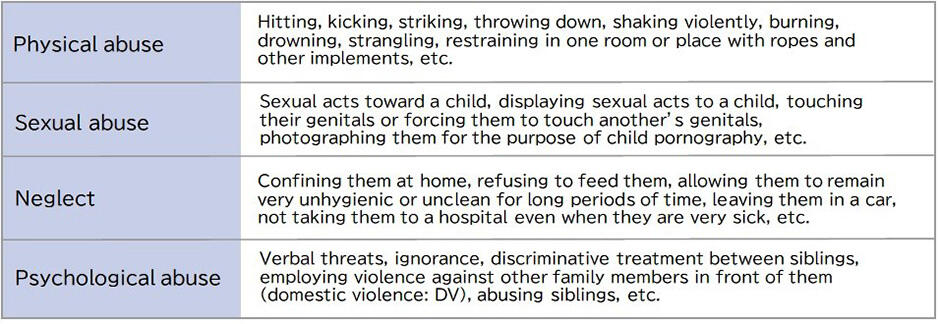
Dr. Tomoda decided to enter this field when she encountered the death of a 3-year-old boy due to abuse-related injuries while she was assigned to a critical care center in her first year as a resident. The entire body of the boy, who was brought in with a cerebral hemorrhage, was covered in bruises, suggesting he had been abused by his parents. The valiant efforts of the doctors that day were not enough and the boy could not be saved. Out of a fervent desire to prevent such an incident ever happening again, Dr. Tomoda has continued her research for many years. In her research, she revealed that both serious abuse and minor maltreatment can damage a child's brain and cause psychological issues as the child matures.
For example, the brains of people who have been physically punished by their parents for an average of eight years or more during their childhood were more atrophied in a specific part of the prefrontal cortex involved in controlling mood, emotions, and behavior when compared to the brains of people who had not been physically punished. Damage to this area can lead to depression, low self-esteem, and drug addiction. In addition, Dr. Tomoda observed deformation in the auditory cortex of children who had not been subjected to physical violence, but had been inflicted with "verbal violence," involving disaffirmation of their selves or being yelled at. Damage to this part of the brain can lower one's ability to comprehend words, making it difficult to hear small sounds and the conversations of others.
In short, an environment of maltreatment results in the formation of a "brain that is not good at controlling emotions" (Fig. 2). "Parents may be eager to discipline their child with "tough love," but it has become clear that none of these actions have the desired effect on children," says Tomoda. Early awareness of the risks associated with maltreatment is essential to reduce child abuse, and Dr. Tomoda continues to communicate that a preventative approach is important from a neuroscientific perspective.
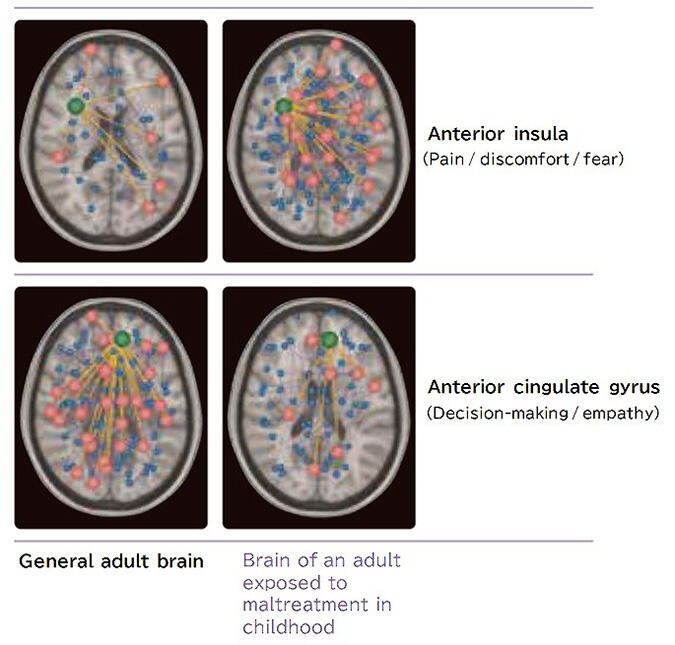
As a result, the "amygdala," which judges likes and dislikes, pleasantness and discomfort, and whether an individual is an enemy or an ally, becomes overactive, and the activity of the "prefrontal cortex" that moderately reduces feelings such as anger is reduced, causing these individuals to be quick to take aggressive action (Nat Rev Neurosci. 2016).
A big step toward social implementation
Fruitful exchanges with local staff
Dr. Tomoda has been participating in RISTEX's "Research and policy of parental support systems to prevent child maltreatment" since 2015 in order to use the results of her research to solve social issues. She aims to create a society that prevents child abuse by aiding child-rearing throughout the region by promoting understanding of maltreatment while sharing knowledge of neuroscience with society. Among these ideas, she continues to emphasize the importance of "support for parents."
The backdrop against which maltreatment occurs is a complex intertwining of factors including financial difficulties, domestic discord, mental problems of caregivers, and disabilities of children. "Treating abusive parents as villains and trying to protect children is not a final solution. We need a system to work together to support the challenges faced by families who have difficulty raising children so that they will not be isolated."
However, in administration of these issues, co-operation between different occupations was not easy because there were few precedents. The turning point was the "Discussion Meeting on Prevention of Child Abuse and Social Implementation of Family Support" held at the Osaka Prefecture Mental Health Center in July 2017. Dr. Tomoda and her colleagues from the University of Fukui's research team and staff in charge of maternal and child health, child welfare, and mental health in the Osaka Prefecture gathered together twice and held discussions with a total of 81 people (Fig. 3).
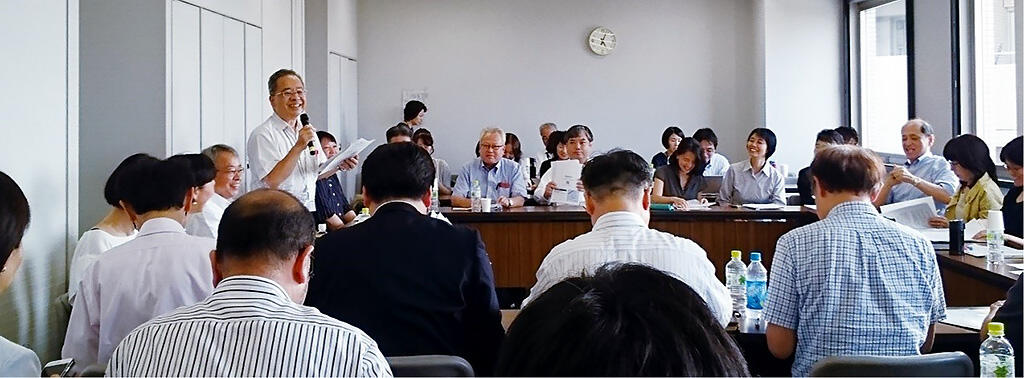
The event was held by Mr. Tadashi Takeshima, Director of the Kawasaki City Invlusive Rehabilitation Center, who serves as a RISTEX program advisor. "I thought it was important for the people involved in the field to get together and have a discussion in order to make the best use of the results of the research and implement the efforts to prevent maltreatment in society."
First, Dr. Tomoda consulted with Dr. Yasunori Sasai, then Director of the Osaka Prefecture Mental Health Center, a public health expert and a senior to Dr. Takeshima when at university. After that, Dr. Sasai was succeeded by the psychiatrist, Director Takao Kagomoto, and their activity continues to this day. "Both of them were good at networking and co-ordination within the government office. They knew exactly which staff could be found where, and what their roles were, and they often reached out to me," recalls Takeshima. Dr. Tomoda also expressed her gratitude, saying, "I was mainly active in the world of research and medical care, and I had no connection with the people in the field of administration. I was very grateful to have a place to talk with people who conduct practical work."
At this discussion meeting, major issues in promoting multidisciplinary collaboration were highlighted. Depending on the field of expertise, the terms and concepts involved in child abuse were varied. For example, consider the word "abuse." In child welfare, which involves temporary protection of children and suspension of custody, only fairly serious cases are called abuse, whereas in maternal and child health, which emphasizes preventive viewpoints, even minor maltreatment is understood to be close to abuse. "At first, we were in a situation where we had difficulty communicating with one another, but we had the same strong desire to prevent abuse in the field. "I gradually became able to understand the issues and situations of others, and to discuss how we can solve these issues," Tomoda said.
Co-operation with two core cities in the Osaka Prefecture
Creating awareness-raising materials for each target
In order for the community to co-operate and support caregivers, the keywords born as common concepts that transcend the boundaries of occupations are "maltreatment prevention" and "community raising," in which the community co-operates to raise children. With the cooperation of field staff in Toyonaka City and Hirakata City, Osaka Prefecture, the core cities with jurisdiction over the health of mothers and children, child welfare, and mental health, they discussed how maltreatment prevention should be enacted.
They decided to produce training materials for assistants and PR materials for general citizens explaining the concept of "maltreatment prevention" and "community raising" to lead to early detection of maltreatment and support for parents. Before the pandemic, the Fukui University team, including Dr. Tomoda, visited Osaka several times, promoting the collaborative development of materials.
One of the materials completed this way is the "Guidebook for Supporters Working with Maltreatment" co-produced with staff from Hirakata City (Fig. 4, left). This document provides accurate knowledge about maltreatment based on current neuroscientific knowledge in an easy-to-understand manner. Another feature is that it provides specific advice on dealing with families suspected of engaging in maltreatment.
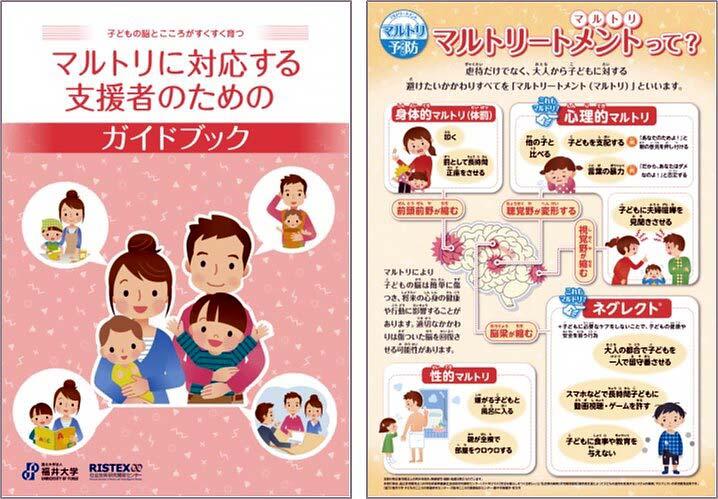
Dr. Tomoda explains her aim as follows. "While many of us, including myself, have been through bitter experiences in this field, families who have difficulty raising children become very guarded when they feel that they are being blamed, and move away from public support. It is important to perceive maltreatment as an SOS in families who have difficulty raising children and to take the time to develop a close relationship with them."
In addition, the 11 types of leaflets for citizens created in collaboration with Toyonaka City are made easy for anyone to read, with the content of each theme combined with illustrations (Fig. 4, right). These materials are now available from the Japan Family Planning Association (JFPA). They are posted on the "Maltreatment Prevention Webpage," and anyone can download them free of charge if they register as a member. Since the opening of the site on November 20, 2020, this information has been used more than 800 times.
Dr. Tomoda has received a series of reports on utilization from users. A junior high school teacher who noticed that his students were being subjected to psychological maltreatment understood the importance of maltreatment from the training materials. It was reported that the student can be protected in a safe environment in co-operation with the person in charge of the Child and Family Affairs Division.
Young childhood welfare officers also shared that they were able to show these illustrated pamphlets to caregivers, and explaining that maltreatment can cause damage to the brains of their children at an early stage. "I'm happy to hear these voices as one of the people involved in the project. We asked supporters from various fields to take the initiative in holding workshops, and I hope to use these materials to expand our efforts to prevent maltreatment," says Dr. Tomoda. In the future, she intends to promote it nationwide in co-operation with the JFPA.
Significance of a preventive approach strengthened via the project
Mr. Takeshima, who has watched over this project, praised the project highly as "a good example of effective collaboration between a local government, research, and a RISTEX project." forward when many departments collaborate on "prevention," he says. "In light of the assumption that everyone can be at risk of engaging in this behavior, a prevention-centered approach should enable us as a society to respond to this problem appropriately."
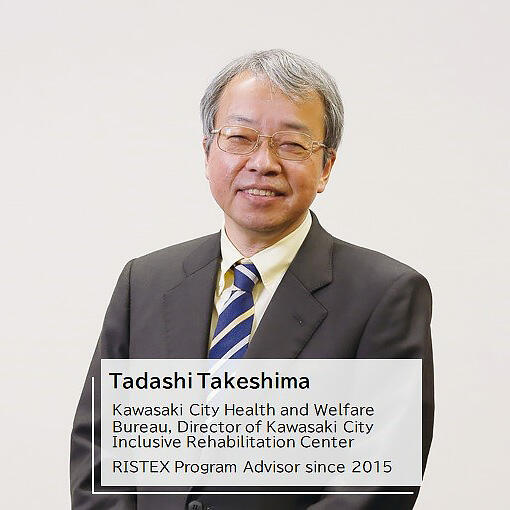
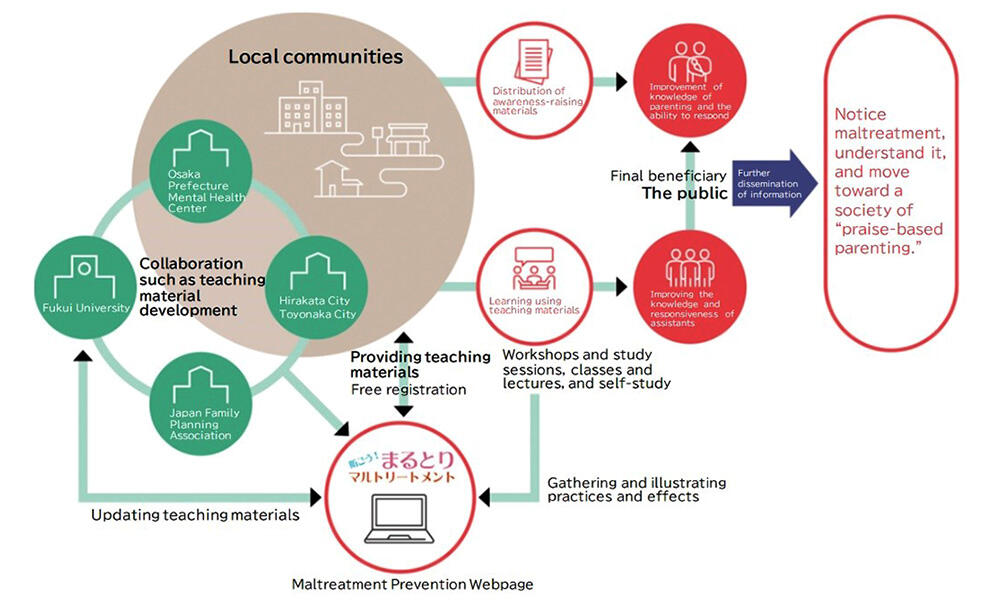
Dr. Tomoda agrees with this. "It is important to correctly approach high-risk families who repeatedly engage in abuse. However, after the abuse has been dealt with, it costs a lot of money to care for the victims and their families, to help them adapt to society, and to prevent recurrence." The goal of our project is to intervene ahead of time and prevent these worst-case scenarios." (Fig. 5).
There is no such thing as the perfect parent, and there is a risk of maltreatment in any home. Moreover, now, during the pandemic, the risk is steadily increasing, as evidenced by the increasing number of abuses reported. According to Mr. Takeshima, the Kawasaki City Mental Health Awareness Survey, conducted in 2020, right as the first state of pandemic-related emergency was declared, showed deterioration of the mental health of the citizens (https://www.city.kawasaki.jp/350/page/0000100851.html).
Among these individuals, citizens with weak connections to those around them deteriorated more. "In my opinion, the pandemic is testing our ability to utilize the universal resources, information, and technology developed through Dr. Tomoda's efforts and the RISTEX 'Creating Safe and Secure Living Environment in the Changing Public and Private Spheres,' " says Takeshima.
When faced with a problem, do not try to solve it alone and ask for help. If anyone is in trouble, reach out and talk to them. Creating a community-based society where everyone can live safely depends on each of us having a "little bit of help," "the courage to ask for help," and a mechanism to encourage it.
